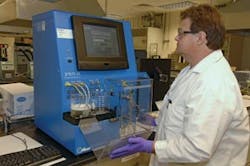Just about every where we turn, we hear news of the effects of global warming. We learn of receding glaciers, rising average temperatures, and other metereological phenomena linked to the warming of our planet. Scientists tell us that we are experiencing a greenhouse effect in the earth’s upper atmosphere that is causing this warming. Though some of the particulates are created naturally by forest fires, volcanic activity, and methane release, the burning of hydrocarbons in modern engines has been cited as a large contributor to these greenhouse gases. We also hear of our growing dependence on oil, particularly that produced in foreign countries. In order to tackle the issue of greenhouse emissions and also look into fossil fuel alternatives, businesses and universities are researching biofuels that could be used on aircraft turbine engines.
Boeing
Boeing helped push aviation biofuel research to the limelight on Sept. 28 when it announced it has a memorandum of understanding with Air New Zealand (a launch customer for Boeing’s 787 Dreamliner) to conduct a biofuel demonstration flight designed to help accelerate the development of viable and sustainable alternative fuels for commercial aviation uses. The company says it is exploring second-generation biofuel feed stocks and processes that have the potential to reduce greenhouse gases through their entire lifecycle.
The demonstration flight is planned for the second half of 2008 using an Air New Zealand Boeing 747-400 equipped with Rolls-Royce engines. Boeing is talking to various fuel-source providers worldwide to identify potential biofuels that are available in suitable quantities for lab and engine testing for performance and compliance with stringent aviation requirements.
“Our near-term goal in this pioneering effort is to identify sustainable alternative bio-jet fuel sources for the planes that are flying today,” says Craig Saddler, president of Boeing Australia. “A significant first step is identifying progressive fuel sources that will provide better economic and environmental performance for air carriers, without any change to aircraft engines or the aviation fuel infrastructure.”
Boeing says the Air New Zealand bio-jet fuel demo flight will highlight the suitability of environmentally progressive fuel solutions (bio-jet fuels) that differ from traditional biofuel development. It says bio-jet fuels will incorporate second-generation methodologies relative to sustainable feedstock source selection and fuel processing, which are uniquely suited for aerospace applications. These bio-jet fuels could potentially be blended with traditional kerosene fuel (Jet-A) to reduce dependency on petroleum-based fuels. Additionally, sustainable bio-jet feedstock sources would avoid deforestation practices and potential competition with global food resources, while helping to lower aviation carbon dioxide outputs.
DARPA
The Defense Advanced Research Projects Agency (DARPA) has also helped push biofuels research to the next level by awarding several grants for biofuel research. Earlier this year, Diversified Energy Corporation (DEC) was awarded a subcontract in support of the Energy and Environmental Research Center (EERC) for an aviation biofuels program. EERC is looking into developing and demonstrating new domestic bio-jet fuel technology for the military. The program is designed to produce bio-jet fuel compliant with the stringent chemical, kinetic, and combustion specifications required of military jet fuel. In addition to demonstrating the viability of bio-jet fuel for use in military aircraft, EERC’s program is also geared toward creating a framework for the eventual commercialization of the technology into the biofuels marketplace.
Centia
DEC is also working with NC State University (NCSU) on developing and testing patent-pending technology for converting oils derived from lipidic compounds (such as agriculture crops, animal fat, algae, waste greases, etc.) to high-value fuels. The technology has been named Centia (a derivation of “green power” in Latin). It will integrate a sequence of three thermal-pressurized-catalytic processes to produce Jet A-1(JP-8 aviation fuel, second generation biodiesel, and other hydrocarbon biofuels like bio-gasoline.
DEC says one key benefit of its process is its ability to use a wide variety of feedstocks. For example, animal fats such as beef tallow, hog lard, and chicken grease are currently available in the United States in excess of 1.5 billion gallons per year. These sources could be used without having direct impact on the food chain (unlike soybean and corn).
DEC says its Centia technology provides the flexibility to produce various biofuels, but the company is targeting the aviation industry initially because of its economic sensitivity to crude oil prices and the lack of bio-based fuel alternatives.
Biofuels hold the promises of reducing our dependence on foreign oil and reducing greenhouse emissions. However, the aviation industry is approaching the technology with caution. Former FAA Administrator Marion Blakey put it best when she told attendees at June’s International Air Transport Association conference that the issue of biofuels in the aviation industry is like “an alligator in a murky pool.” If the industry wants to swim in the pool, it needs to be cautious, or the alligator “could come up and bite us.”
